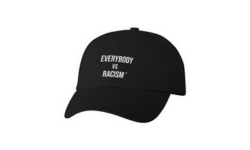We are frequently requested to file trademark applications for popular slogans, whether political or otherwise. Sometimes such slogans may be registrable but only if the mark acts as a source identifier and is used accordingly. Often, the applicant simply wishes to monetize the use of a popular slogan that everybody else uses without any thought as to the nature and purpose of a trademark. In a recent case before the U.S. Court of Appeals for the Federal Circuit, In Re GO & Associates, LLC, the court considers why such trademark applications may not be registrable. Here is a brief overview.
In June 2020, GO & Associates, LLC (“GO”) filed a trademark application for EVERYBODY VS. RACISM. The mark identified the following goods and services:
Tote bags, T-shirts and other clothing, and promoting public interest and awareness of the need for racial reconciliation and encouraging people to know their neighborhood and then affect change in their own sphere of influence.
The Examining Attorney reviewed the application and issued an Office Action finding that the trademark failed to act as a source identifier for the identified goods and services. Instead, the Examining Attorney wrote that the mark was “an informational social, political, religious, or similar kind message that merely conveys support of admiration for or affiliation with the ideals conveyed by the message.” In support of this conclusion, the Examining Attorney cited various sources including use by referees in the National Basketball Association, titles of rap songs, podcasts, church sermons, and YouTube videos. GO disagreed, arguing that the Examining Attorney’s examples were merely ornamental uses of the trademark and that third-party uses of the mark did not “render the mark incapable of functioning as a trademark.”
In response, the Examining Attorney issued a final Office Action stating that it was unpersuaded by GO’s arguments and, in fact, wrote that the “competitors’ ornamental uses of the mark only reinforce the fact that consumers would likely view the mark as as a sentiment rather than a source.” Moreover, if the USPTO were to grant GO a registered trademark that would exclude others from using EVERYBODY VS. RACISM, it “would seriously impede the heartfelt need of citizens of the country to express that everybody should be against racism.”
Undeterred, GO appealed to the Trademark Trial and Appeal Board (TTAB), which affirmed the Trademark Examiner’s rejection of the trademark application. Not taking no for an answer, GO appealed the Board’s decision to the U.S. Court of Appeals for the Federal Circuit, which recently issued an opinion, affirming the TTAB decision.
The Circuit Court’s opinion is interesting to the extent that it defines the boundaries for what constitutes a source identifier. The court wrote that a threshold requirement for registering a trademark is that it “identify and distinguish” the goods and services of the applicant from those of others, as well as “indicate the source” of those goods and services. The source requirement is determined by “how the mark is used in the marketplace and how it is perceived by consumers.” The court held that there was substantial evidence supporting the Board’s determination that “EVERYBODY VS. RACISM” does not function as a source identifier. The court reviewed the Trademark Examiner’s evidence and agreed that the “diversity and breadth of third-party uses” were insufficient to render the mark a source identifier. Importantly, the court held that:
if the PTO were to allow the registration of marks that are used by the public in such a way that they cannot be attributed to a single source, the purpose of trademark law would be undermined to the detriment of the public who would be no longer free to express common sentiments without paying a license fee to someone who sees an opportunity to co-opt a political message.
The court found that substantial evidence supports the Board’s conclusion that the public is unlikely to associate the mark as a source identifier of GO’S goods and services. The case underscores the difficulty of registering trademarks that are widely used slogans. Applicants should beware.
— Adam G. Garson, Esq.


